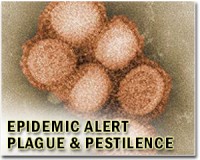| . |  |
. |
Washington DC (SPX) Feb 23, 2011 There are over 200 million cases of malaria each year and, according to the World Health Organisation, in 2009 malaria was responsible for 781,000 deaths worldwide. Malaria is spread by mosquitoes which breed in open water and spend much of their larval stage feeding on fungi and microorganisms at the water surface. New research published in BioMed Central's open access journal Parasites and Vectors presents a method of dispersing pathogenic fungi as a means of preventing the spread of malaria. The parasite (genus Plasmodium), which causes malaria, is transmitted to humans with mosquito saliva during a bite, where it invades the liver and red blood cells causing fever. Once infected, it can be difficult for a human host to recover because some species of Plasmodium are able to lie dormant and evade antimalarial drugs. These parasites are also becoming resistant to the antimalarials taken to prevent infection. An alternative way of reducing the risk of malaria infection is to kill the mosquitoes. The fungi, M. anisopliae and B. bassiana, cause muscardine disease in mosquito larvae, leading to their death before they can pupate and develop into the adult form. Tullu Bukhari and colleagues from the Laboratory of Entomology, Wageningen University, The Netherlands, have used a synthetic oil (ShellSol T) as a means of dispersing fungal spores over the surface of water. The oil-spore preparation is easy to mix and use of the oil improved the dispersal of spores across the water. This simple formulation increased both the persistence and effectiveness of spores, killing up to 50% more larvae than untreated spores and reducing pupation levels to less than 20% at a test site in Kenya. Speaking about the research Tullu Bukhari said, "these fungi provide an effective means of controlling malaria mosquitoes. Both spores and the oil have minimal risk to fish and aquatic organisms and so are also environmentally safe."
Share This Article With Planet Earth
Related Links BioMed Central Epidemics on Earth - Bird Flu, HIV/AIDS, Ebola
 Seaweed defense offers clues against malaria
Seaweed defense offers clues against malariaWashington (AFP) Feb 21, 2011 Seaweed emits a natural chemical response to ward off fungi that would otherwise colonize an injured plant, a process that could help the search for anti-malaria drugs, a US scientist said Monday. Up to a million people per year die from malaria, which can be caused by the parasite Plasmodium falciparum, and new drugs are needed because the parasite is developing resistance to popular pharma ... read more |
|
| The content herein, unless otherwise known to be public domain, are Copyright 1995-2010 - SpaceDaily. AFP and UPI Wire Stories are copyright Agence France-Presse and United Press International. ESA Portal Reports are copyright European Space Agency. All NASA sourced material is public domain. Additional copyrights may apply in whole or part to other bona fide parties. Advertising does not imply endorsement,agreement or approval of any opinions, statements or information provided by SpaceDaily on any Web page published or hosted by SpaceDaily. Privacy Statement |